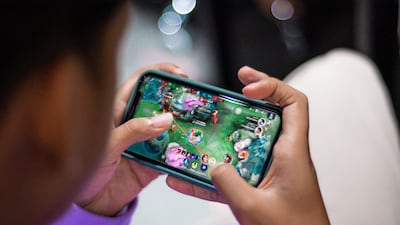This month, I was informed I had spent 3,772 hours playing Mobile Legends, a video game I first came across in 2019.
A year later, during the height of the Covid-19 pandemic, I would often disappear into the game's Land of Dawn with nine other people I'd never met before – strangers who for the next 10 minutes or so would either be my best friends or my mortal enemies.
There was no debilitating virus in that world. No limitations, no face masks, no social distancing. And we had powers. I could flick a magic umbrella or summon a friendly giant. I could be a deadly sniper or a football player with a robotic leg. In that world, rewards and punishments were clear: destroy the enemy base and you get a star.
The Land of Dawn was easily accessible (with no travel restrictions) by clicking on my phone.

In the multiplayer online battle arena (MOBA), 10 players are divided into two opposing teams. Each has to choose among a roster of diverse heroes with unique abilities and roles, such as marksmen, mages and assassins.
Unlike in other popular MOBA games, a match in Mobile Legends is fast-paced. A game can end in 10 minutes, before you go into another one with new players and characters.
Fun (and games) aside, the realisation that I had spent nearly 160 days straight playing it got me thinking about the less-spoken pros of gaming. Here are three key takeaways:
I can find peace in a video game
Although a match can be intense, it grounds me to some sense of order and certainty, especially during times when everything else seems up in the air.
Because it's a game, a lot of the elements are based on mathematical configurations: how fast can you cast a skill with your character statistics to obliterate an enemy hero, or what equipment should you buy to counter someone with a strong physical advantage.
Aside from individual capabilities, a victory in Mobile Legends relies on team co-ordination and strategy: which heroes go well together or exactly when do you engage in a team fight.
The decisions you make in the game are not abstract or based on some whim, and their consequences are immediately measurable. This structure – and the resultant peace that comes with it – is sometimes hard to find in real life when things are uncertain.

For decades, researchers and lawmakers have told us how bad video games could be for our well-being. In 2019, the World Health Organisation listed “gaming disorder” as part of the International Classification of Diseases, with its excessive use often likened to the consumption of drugs.
Although it's true that addiction, in any form, is damaging, I believe games have acquired a notoriety that unfairly ignores their potential to help some people make sense of the real world. As a 2022 study noted, video games could also boost children's cognitive skills.
The fast-paced nature of Mobile Legends prevents it from becoming overly immersive, as you snap out of the fantasy after 10 minutes or so. These bouts of escapism, even just for a short period, are just what we need sometimes.
I can find real community in the fictional world
Since Mobile Legends' creation in 2016, its popularity has blossomed, particularly in South-east Asia, where it's now part of the region's Olympics under the e-sports category. It is also big in the Middle East, with teams from the UAE and Saudi Arabia competing in international tournaments.
I'm not a professional player, but this sense of community is felt in every game I take part in. Playing with nine others in a strategic environment forces me to communicate, to give and take instructions, and to be mentally present for the other gamers.
Close to four years of gameplay have given me the opportunity to also make connections offline. I'm now in touch with some of the people I first met in the game. As the pandemic taught us, online communities can be just as genuine as – and sometimes even better than – the real thing.
These communities tend to be extremely diverse, with gamers coming from different parts of the world. I play on the Middle East server, where there are players from countries including Kuwait, Qatar, Bahrain and Saudi Arabia.
Outside the game, there are forums of people sharing strategies and discussing team optimisation. The shared experience goes way beyond the 10-minute gameplay, and allows people to engage with like-minded folk.
I'm a better person because of Mobile Legends
Ultimately, I think I'm a better person because of this game. When things get too heated, for instance, I know when to pause and prevent myself from accessing toxic behaviour online. I find I do the same in real-life situations. In this game, you are tested a lot, and it's become a good practice of self-awareness.
Losing is a big part of Mobile Legends, and there are times when you lose on a streak of 10 consecutive matches. When it happens so often, eventually it becomes easier to swallow that some players are just better than you.
You just have to go into another match and try again, a resilience I never imagined would be so poignantly demonstrated or inculcated by a video game.

